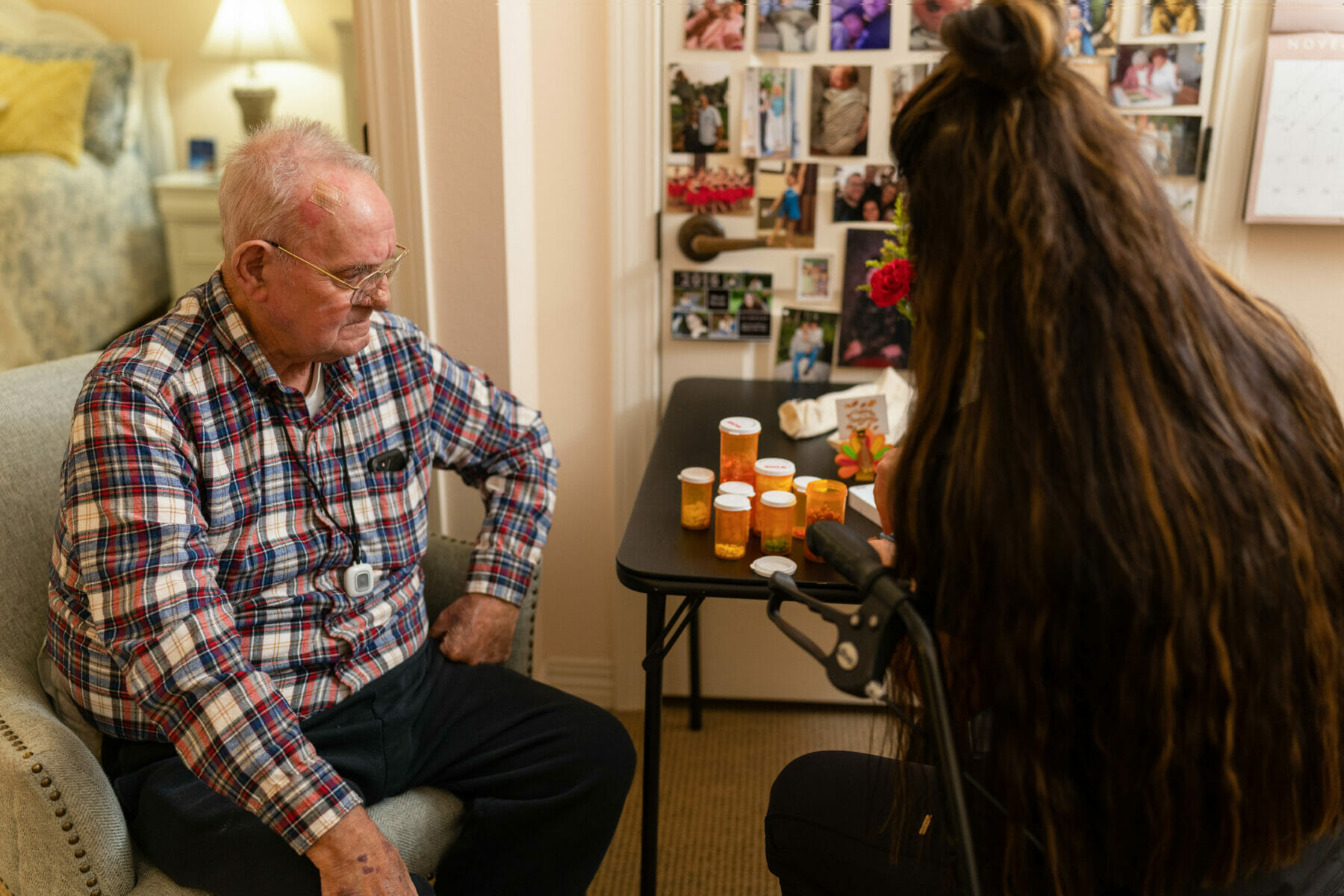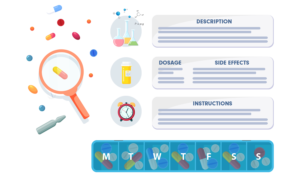
Home health is not just for major diseases.. That are countless conditions that qualify you for home health services. Learn about 6 ways that you may not know qualify a person for home health BEFORE a major change or complication occurs.
Did you know that Medicare has two basic requirements to qualify for home health? The first is that the person be homebound. This is not the same as being bedbound. Check out our other blog to learn more about what it means to be homebound. The other requirement for home health services is that the person must have a need for a skilled service.
What are Skilled Services?
Skilled services are those types of services that require the skills and expertise of a medical professional and are reasonable and necessary for the treatment of a person’s illness or injury. To illustrate, imagine needing help with one of the following:
- Post-surgical care
- Wound care
- Stroke rehabilitation
Now try and imagine taking care of these on your own. Managing these without the aid of a nurse or therapist would be extremely difficult and could cause harm if you were to try and do so yourself.
Skilled services, though, are not just for major, life-altering diseases or injuries. In fact, they are often used when there is only a reasonable potential for change in a person’s condition that could be identified, treated, or even prevented by skilled observation and assessment by a medical professional.
Continue reading to learn about 6 ways that you may have not considered before that qualify a person for home health before a major change or complication occurs.
What Qualifies Me For Home Health?
Abnormal or Fluctuating Vital Signs
One such way to qualify is when you are experiencing abnormal or fluctuating vital signs. Simple to do, the collection of vital signs is perhaps the most important information gathered as vital signs play an essential role in predicting who is at risk of clinical deterioration.
Abnormal or fluctuating vital signs are often indicative of some sort of abnormality. This could be something as simple as an unwanted side effect of a medication or perhaps something more serious like an underlying illness or disease. Reacting promptly to these changes in vital signs can help identify and prevent serious health related consequences like falls, hospitalizations or even death
Vital signs are not static values; they are always changing. While single, abnormal readings are worrisome, they are better understood when interpreted as trends. When a patient’s health condition has changed or there is a potential for change, Active Home Health helps monitor vital sign trends. This not only provides a better understanding of the person’s overall health, but also allows for faster detection of abnormalities and better medical care.
Weight Changes and Edema
Unexpected weight gain or weight loss is often indicative of any number of underlying diseases. These may be known diseases where a person is experiencing a flare or worsening of the disease process. Often, a change in weight, especially weight loss, reflects the development of a new disease.
Edema is just one of many weight-related symptoms that home health helps with. About 20% of all adults aged 51 and older deal with lower limb edema, also known as peripheral edema. Some of the risk factors associated with edema include older age, diabetes, hypertension, renal failure, and congestive heart failure. People with edema report higher levels of pain, low activity, and mobility limitations. These physical effects of edema are often compounded by social consequences, including higher medical costs, increased care burden and social isolation.
All too often, people living with edema find themselves in a vicious cycle, caught between the physical and social effects of edema. When caught in between these effects, unfortunately, edema often worsens. Without outside help, people struggle to break that cycle and maintain or improve their quality of life.
Active Home Health helps break the cycle of worsening edema. Our staff of nurses, therapists, and CNAs reduce caregiver burden and medical costs for everyone involved. Our in-home treatments help better manage edema all while helping the person overcome physical limitations, increase daily activity, and decrease pain. Some of the many ways we help include medication management, weight monitoring, disease education, and physical therapy.
Respiratory Changes and Newly Ordered Oxygen
Irregular respiratory patterns are often the first indicators of changes happening with an underlying disease. These diseases include COPD, heart failure, pneumonia, and asthma. They all cause dyspnea and fatigue and contribute to a decreased quality of life. When identified, prompt action to address these irregularities is essential to maintaining a person’s independence and health.
One such action is through the use of oxygen therapy. Long-term oxygen therapy is a therapeutic mainstay in the treatment of respiratory diseases. While it has a proven benefit in improving a person’s quality of life and decreasing their risk of mortality, oxygen therapy also requires a lot of support, especially in the beginning. Consider the following experience:
“All the oxygen equipment was ‘dumped’ on me. I knew nothing and was in a daze. I am sure that the delivery guy gave me some instructions when it was delivered but I retained nothing.”
Unfortunately, this user’s experience is not an outlier. Supplemental oxygen can be difficult and confusing to use. An overwhelming amount of information often leave users feeling mentally and physically burdened by their health status. The American Thoracic Society encourages the education of patients as a best practice for all who are prescribed oxygen therapy.
“For patients prescribed home oxygen therapy, we recommend that the patient and their caregivers receive instruction and training on adherence to their oxygen prescription; the use, maintenance and troubleshooting of all oxygen equipment; and education on oxygen safety, including smoking cessation, fire prevention, and tripping hazards”
There is no one better suited to provide this education than Active Home Health. Not only can we educate both the user and other caregivers on proper use and safety, but we can also provide recommendations to improve supplemental oxygen use. This recommendations are customized to fit your needs, in your home. Our team can help identify any potential barriers to use. Proper reassessment of home oxygen needs is essential to a user’s well-being. We continually assess their health condition and if it improves, we can help the user taper down and even ween off their supplemental oxygen completely.
Medication Changes and Effectiveness
Did you know that up to 60% of patients can’t accurately report what their providers expect of them 10 to 80 minutes after speaking with them? Whether intentional or not, there is a disconnect between the doctor’s office and a person’s home.
All too often, questions arise that a person may not have been apparent while at the doctor’s office. These questions can arise at anytime and often become barriers to improving your health. Some of these questions may include:
- How is the medication supplied?
- How often do I need to take it?
- Do I need to take it with or without food?
- How does it fit into my normal day to day routine?
- What is the cost of the medication?
- How long do I need to take it?
- What are the potential side effects?
- Why do I need this medication?
Active Home Health helps you and your doctor identify and address these and other potential barriers. We monitor efficacy, making sure the correct dose and frequency are being utilized. Our team explains key information and expectations about the medication. We simplify medication regimens, preventing them from dominating the person’s life. We manage side effects and recommend changes as needed.
Confirmed or Suspected Urinary Tract Infections
Urinary Tract Infections (UTIs) are difficult to diagnose in the elderly. They don’t always present with the typical UTI symptoms of dysuria, increased frequency, and urgency. Instead, the elderly often present with non-typical symptoms such as nausea and vomiting, confusion, lethargy, anorexia, and new-onset incontinence. These non-specific symptoms make it difficult to differentiate between a UTI and countless other possible diagnoses.
In addition to being difficult to diagnose, the elderly are also more susceptible to serious consequences from untreated infections. Unfortunately, even delaying antibiotic treatment can put a person at risk for these consequences. These consequences include:
- Increased risk of death
- Increased risk of hospitalization
- Sepsis
- Pyelonephritis or kidney infection
- Decreased quality of life
- Increased healthcare costs
Active Home Health helps eliminate any possible delay in treatment. We can confirm the presence of a UTI via urinalysis. We ensure the right antibiotic is selected, managing side effects, and watching for signs of improvement. In addition to managing the UTI treatment, our staff helps identify the cause of the infection. If no UTI is present, we work with the provider to help identify other possible causes for the symptoms and prevent further deterioration.
Behavioral Management of Dementia and Other Disorders
Conditions that affect one’s behavioral health are common and nondiscriminatory. They happen to all people, of all ages, of all backgrounds. With our aging population, one of the most common conditions affecting behavioral health in the elderly is dementia. Unfortunately, dementia is not only associated with cognitive decline. Up to 90% of those with dementia experience some form of behavioral problems, secondary to their cognitive decline.
Behavioral problems associated with dementia can occur at any point in the person’s decline. They include abnormal behaviors like increased aggression, wandering, delusions, hallucinations, sleep disturbances, anxiety, and sexual disinhibition. These behaviors have many negative consequences for both the person and their loved ones. These include the following:
- Disruption of family, social and institutional networks
- Increased danger to themselves and others
- Increased caregiver burden and distress
- Increased hospitalizations
- Early admission to long-term care
Figuring out the cause of these behaviors can feel much like cracking the code on combination lock. On the surface, the outward behavior may be apparent while the cause or triggers for these behaviors may not. Active Home Health offers multiple interventions for both the behavioral problems seen with dementia and their associated triggers. We promise to help you and your loved ones find the solution that fits their loved one’s needs. Recommendations made by our nursing and therapy staff focus on identifying behavioral triggers, techniques aimed at modifying behavior, and adapting the environment to meet the person’s specific needs. If necessary, our staff can even initiate and manage medications to help maintain control of these negative behaviors.
These behaviors come and go; solutions that worked in the past may lose efficacy. So whether it’s the first or the hundredth time, home health eases the burden of behavioral symptoms of dementia and other disorders, provides solutions to these problems, and improves the quality life of everyone involved.
Why Choose Active Home Health?
All too often we are reactive about our health. We wait until we can’t take it anymore, until the pain is unbearable, or we injure ourselves. This often leads to ER visits and expensive bills. It leads to life-changing diagnoses that require major lifestyle changes.
Active Home Health allows you to be proactive about your health. Observation and assessment of a person’s condition qualifies you or your loved one for home health services when there is even a potential for change or complication in your condition. This short-term service may only last for a few weeks but it is instrumental in helping you stay in your homes and avoid hospitalization or admission to a long-term care facility.
Call and schedule your free, in-home assessment and experience for yourself how we can restore you to your active lifestyle today!




